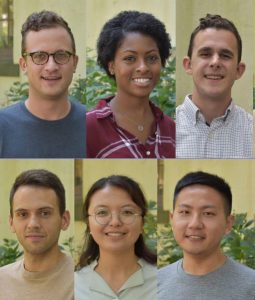
Six Carolina Planning students were awarded Southeastern Transportation Research, Innovation, Development and Education (STRIDE) Center funding for their city and regional planning capstone projects. Capstone projects are required of students in the UNC master’s program.
“Students at UNC bring it all together by working on a master’s capstone project during their final year of the program,” said Noreen McDonald, professor and chair of the UNC Department of City and Regional Planning. “The project lets them go deep on what really interests them.” Students worked with faculty and external clients to develop and execute project ideas.
STRIDE funding greatly benefited students, especially during the COVID-19 pandemic. “Students faced extraordinary challenges due to COVID,” McDonald said. “In response, we created the Master’s Project Seed Fellowship program which provided funds for students to work on their project during the summer.”
“Receiving STRIDE funds for this time has been a great help in terms of cost of living and reduction in debt.”
STRIDE funding, supported by the Center for Urban and Regional Studies, provided critical support and professional experience during a time when most internships were being cancelled. The selection process involved faculty who reviewed proposals for the Seed Fellowship. STRIDE funding was prioritized for projects that addressed critical transportation questions impacting congestion.
“STRIDE funding supports top transportation planning students at Carolina by directly supporting their education and allowing us to support Transportation Review Board conference attendance along with regular talks related to transportation careers and topics,” noted McDonald.
STRIDE funding supported research for the following capstone projects:

Doug Bright: A 15 Minute Windy City: The Promise and Limits of Living Near Resources in Chicago. “For my capstone, I extend a 15-minute city analysis done by Jeremy Glover at Metropolitan Planning Council, investigating accessibility and its impacts in Chicago, based on this European model.”
Derrice Haynes: Mapping Food Diversity and Access through Transit Connectivity in North Carolina. “Inadequate food access in communities is brought upon from disinvestment or misallocation of public resources. Urban sprawl has also enabled the curation of food deserts with its focus on private mobility to the general exclusion of other forms of transit. My research examined transits’ contribution in supporting or challenging food access by analyzing the interconnectivity between public bus transit and food venues in various North Carolina communities. The results provide a tool for transportation and food systems planners to identify and build equity in food scarce areas by prioritizing investments in sustainable and diverse transit and food systems.”
Evan King: Now or Never? Timing and Railroad Relations in Commuter Rail Projects. “My work this past summer consisted of several avenues of research and engagement work revolving around GoTriangle’s ongoing studies for a possible commuter rail line between Raleigh and Durham. At GoTriangle, I conducted research on the legal arrangements between transit agencies and railroads in cases where commuter rail service ran on freight railroad-owned tracks. I also worked on engagement materials centered on clarifying the meaning (and potential value) of commuter rail for the public and other stakeholders. My own capstone research branched off that on freight-transit legal arrangements to a broader study of railroads as actors in modern commuter rail initiatives, and my time spent on research in this direction has involved time-intensive search and compilation of information on these projects. The broad purpose of my project is to assess the relative importance to a transit agency of pursuing more perfect satisfaction of railroad interests versus completing a commuter rail project quickly – with GoTriangle’s particular position in mind.”
Christian Snelgrove: Telework and COVID-19. “As a result of COVID-19, American workers have been engaged in the real-world ‘experiment’ of shifting to telework en masse. However, this shift did not occur evenly. I conducted a behavior/attitudinal survey investigating if COVID-19 has caused a change in people’s attitude towards telework. Respondents reported their actual and desired telework frequency before COVID-19 and today. I also asked respondents to report on demographics, their employment history throughout the pandemic, commute characteristics/attitudes, and specific attitudes and experiences related to telework and COVID-19. Using this data, I stratified the attitudinal and behavioral data. I also reported on general trends in attitude and behaviors. Generally, respondents report a broad shift in preference towards increased telework, though experiences with telework during the pandemic are uneven across various socio-economic characteristics.”
“The funding helped me to conduct Landsat data acquisition, data analysis and field study during the summer, which laid a solid foundation for my capstone project.”
Cai Wang: Detecting Land Cover Change with Remote Sensing Data in Area Around Pudong Airport in Shanghai, China. “Coastal regions like Beijing, Shanghai, Shenzhen in China have experienced rapid economic growth during the last two decades, and the increasing quality of people’s life has led to diverse demands for cultural products. At the same time, many industrial factories and millhouses, built in the central part of the city during the last century, have been underutilized for quite a long time. For places experiencing post-industrialization, brownfield regeneration has been a popular topic involving environmental protection, social justice, cultural preservation and real estate development. My research aims to consolidate the best brownfield regeneration practices specifically for maximizing the development of the urban cultural industry. Moreover, since China is experiencing a large-scale urban renewal movement for economic development and social welfare, this research will be beneficial to maintain a balance between social equity, culture preservation and project efficiency in the future.”
Weiwen Wang: Exploring Creative Industry-Oriented Development within Context of Brownfield Regenerations in West China. “My research aims to consolidate the best brownfield regeneration practices, specifically for maximizing the development of the urban cultural industry. Moreover, since China is experiencing a large-scale urban renewal movement for economic development and social welfare, this project research will be beneficial to maintain a balance between social equity, culture preservation and project efficiency in the future.”